
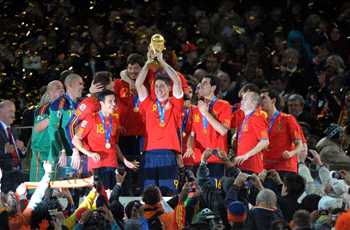
The Good
The African Vibe
Africa was handed a golden opportunity to convey, as a continent, its passion and dedication to the game, and without their fervent support, World Cup 2010 would have been a damp squib.
Instead, the unequivocal backing of the hosts behind their national team, Vuvuzelas and all, endeared the Bafana Bafana to the watching billions and made an honorary South Africa fan out of all of us.
Ghana represented Africa in the quarter-finals, becoming only the third nation do so after Cameroon and Senegal, and but for a cruel twist of fate could have been the inaugural semi-finalists. Their graciousness in defeat, and indeed the swashbuckling style that steered them so well, was a prolonging memory of this, a multi-cultural and overwhelmingly peaceful event.
Viva Espana
While the repeated 1-0 scorelines may offer a different story, Spain’s footballing philosophy ultimately ousted the negative, stifling tactics that threatened to undermine the tournament.
Despite struggling in front of goal, La Furia Roja had a completed passes total of close to 3,500 at the tournament end, almost 1,000 more than the Oranje, and during South Africa 2010 they finally merged beautiful build-up with European efficiency, creating a force that proved worthy of the greatest title the game can offer.
Xavi, Iniesta, and instrumentally David Villa were the integral cogs in this incessant Spanish machine, and now a golden generation finally glitters.
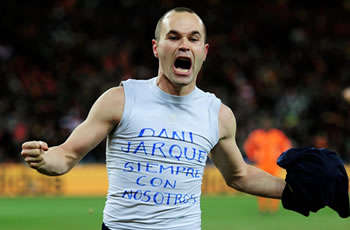
The Underdog
Before every World Cup begins, the potential winners are selected and the whipping boys disregarded, but for a number a lesser lights, South Africa will be a tournament to savour.
New Zealand, the rank outsiders, managed to exit the tournament unbeaten, while Slovakia exceeded a nation’s expectations by narrowly losing out to the eventual finalists, the Netherlands.
Elsewhere, North Korea’s goal against Brazil made their efforts worthwhile, while Mexico and Uruguay confounded the odds (and history) to progress, with the latter reminiscing from the memories of their forefathers by finishing in fourth place. All in all, many underdogs had their day in South Africa.
The Bad
The Jabulani
The Jabulani
There is simply no defending FIFA’s decision to sanction the use of a ball that took the players weeks to comprehend, and that drastically reduced the amount of long-range goals in this tournament.
Goal.com, with the assistance of former Dutch striker Clive Wijnhard, recently carried out a number of experiments on the much-maligned Adidas creation (see the video here), and the steady decline of the fundamental equipment of the sport from spherical consistency to unpredictable ba-lunacy has left players and goalkeepers alike cursing its use.
Big-name Flops
The World Cup is supposed to be the breeding ground of greats, where club football form aligns itself with the international stage, and the opportunity for infamy is born.
Unfortunately, World Cup 2010 saw more Flops than Tops, with those that have excelled at club level failing to transmit their domestic form into that of the national team dynamic.
Cristiano Ronaldo, Wayne Rooney and Lionel Messi were among those who arrived with top billing but were overshadowed by effervescent youngsters and understated nearly men, and in the end, produced an unexpected final foursome.
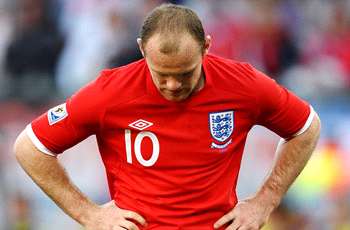
Refereeing
Goal.com’s review of controversial decisions can give you a concise deconstruction of some of the major errors that have blighted this tournament, and have opened the door for numerous debates as to the future of the games’ officiating.
But the petty, unjust red cards combined with ridiculous offside calls and a generally below-par display from the refereeing teams that FIFA had championed has led the governing body into a curious re-assessment of its assignment of its representatives, and consideration of the implementation of video evidence.
2010 could be remembered as the year when technology became no longer an option, but a necessity.
The Ugly
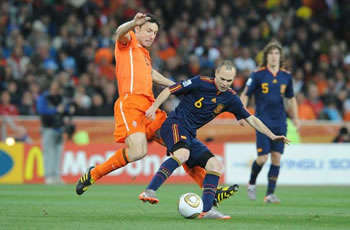
Oranje's World Cup Final Tactics
The showpiece event that bookends football’s biggest tournament is rarely a free-flowing spectacle, but observers had hoped that two European underachievers could come together to create a final for the ages.
However, the Oranje came to the realisation early in the contest that they could not compete with Spain on their terms, and so descended into an attempt to suffocate their superior opponents rather than play them at their own game.
As a result, the likes of Van Bommel and De Jong were administered to subdue and dispel the threat of the Barcelona-based quartet that led the line for La Furia Roja. As a result, the yellow cards accumulated, and ultimately, the Netherlands sacrificed a modern brand of total football in favour of a more universal, contemptuous approach.
Cheating
Despite numerous attempts to eradicate its stench from the sport, cheating managed to seep its way into the tournament and undermine what was in the main a well-behaved and courteous display by all competing players.
Kader Keita’s blatant attempt to ensure Kaka was dismissed was a particular lowlight, as was Joan Capdevila versus Portugal. However, Luis Suarez’s blatant handball in the quarter-final match versus Uruguay, as instinctive as it was, took a shine from the South American’s sensational run to fourth place.
Unfortunately, the Ajax man’s celebration after his Hand of God impersonation will prove to be a lasting memory that eclipses FIFA’s fair play mantra, and one that left Africa with a feeling of dissatisfaction for the remainder of the tournament.
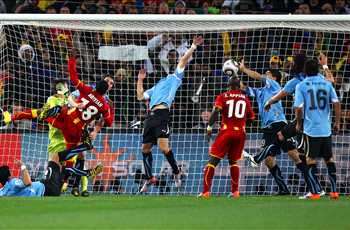
The Vuvuzela Debate
The commentary that accompanied the South African tradition was infinitely more tiresome than the event itself, and glossed over the pride that followers of Bafana Bafana attempted to display from their unique brand of expression.
Whilst the noise was a new experience to European travellers, the overreaction to their use at games was as much to do with the tepid nature of the opening fixtures as the disturbance they caused to the match atmosphere.
In the end, the uninitiated feared a global epidemic, while Africa simply wanted to showcase their heritage to the watching world.


0 comments:
Post a Comment